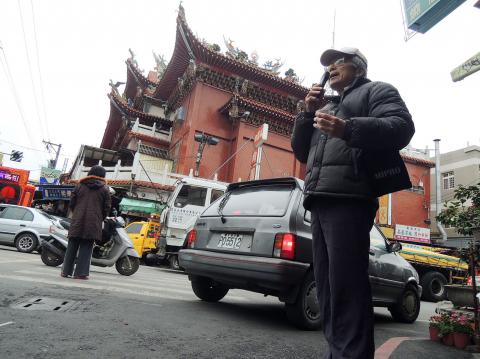The Democratic Progressive Party (DPP) yesterday filed a complaint with the Control Yuan over what it said was the Ministry of Education’s (MOE) administrative errors in its recent effort to change high-school history textbook outlines.
The ministry approved the adjusted outlines on Monday night despite strong public outcry over its perceived attempts at “de-Taiwanization and sinicization.”
DPP deputy secretary-general Lee Chun-yi (李俊毅), spokesperson Lin Chun-hsien (林俊憲), Department of Social Development director Kuo Wen-pin (郭文彬) and lawyer Huang Di-ying (黃帝穎) submitted the document, which listed five complaints about ministry administrative errors, to the Control Yuan yesterday afternoon.

Photo: Yen Hung-chun, Taipei Times
“The MOE violated administrative procedures, the principles of neutrality and professionalism and the principle of a bottom-up consultation, and the changes were unnecessary and inconsistent with the historical facts,” Lin said.
The opaque process of the “adjustment” violated democratic principles and infringed upon the rights of students, teachers and parents, Lin added.
The ministry used “minor adjustment” as an excuse for what later became almost an overhaul of the high-school history curriculum, which betrayed historical facts, the spokesperson said, adding that the move was “political brainwashing” for the purpose of spreading a “Greater China perspective.”
Considering that Minister of Education Chiang Wei-ling (蔣偉寧) has refused to communicate with and offer an explanation to the public, the DPP caucus will “declare war with the ministry in the Legislative Yuan,” Lin said.
Lee accused Chiang of involving himself in the adjustment as a “political tool for the Ma Ying-jeou (馬英九) administration” and demanded that the watchdog impeach Chiang.
Control Yuan member Ma Yi-kung (馬以工) received the complaint, saying that it would be assigned for investigation, but added that the DPP was required to back up its complaint with more information.

Taiwan would welcome the return of Honduras as a diplomatic ally if its next president decides to make such a move, Minister of Foreign Affairs Lin Chia-lung (林佳龍) said yesterday. “Of course, we would welcome Honduras if they want to restore diplomatic ties with Taiwan after their elections,” Lin said at a meeting of the legislature’s Foreign Affairs and National Defense Committee, when asked to comment on statements made by two of the three Honduran presidential candidates during the presidential campaign in the Central American country. Taiwan is paying close attention to the region as a whole in the wake of a

President William Lai (賴清德) has appointed former vice president Chen Chien-jen (陳建仁) to attend the late Pope Francis’ funeral at the Vatican City on Saturday on his behalf, the Ministry of Foreign Affairs said today. The Holy See announced Francis’ funeral would take place on Saturday at 10am in St Peter’s Square. The ministry expressed condolences over Francis’ passing and said that Chen would represent Taiwan at the funeral and offer condolences in person. Taiwan and the Vatican have a long-standing and close diplomatic relationship, the ministry said. Both sides agreed to have Chen represent Taiwan at the funeral, given his Catholic identity and

Chinese Nationalist Party (KMT) Chairman Eric Chu (朱立倫), spokeswoman Yang Chih-yu (楊智伃) and Legislator Hsieh Lung-chieh (謝龍介) would be summoned by police for questioning for leading an illegal assembly on Thursday evening last week, Minister of the Interior Liu Shyh-fang (劉世芳) said today. The three KMT officials led an assembly outside the Taipei City Prosecutors’ Office, a restricted area where public assembly is not allowed, protesting the questioning of several KMT staff and searches of KMT headquarters and offices in a recall petition forgery case. Chu, Yang and Hsieh are all suspected of contravening the Assembly and Parade Act (集會遊行法) by holding

Lawmakers from the Democratic Progressive Party (DPP) yesterday established a friendship group with their counterparts in Ukraine to promote parliamentary exchanges between the two countries. A ceremony in Taipei for the Taiwan-Ukraine Parliamentary Friendship Association, initiated by DPP Legislator Chen Kuan-ting (陳冠廷), was attended by lawmakers and officials, including Deputy Minister of Foreign Affairs Francois Wu (吳志中) and European Economic and Trade Office in Taiwan Director Lutz Gullner. The increasingly dire situation in Ukraine is a global concern, and Taiwan cannot turn its back when the latter is in need of help, as the two countries share many common values and interests,